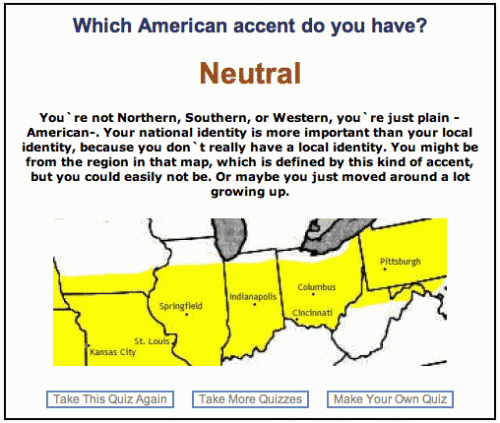“Or maybe you just moved around a lot growing up.”
That sounds right.
In Islands in the Net I think Sterling refers to the homogenization of American accents as the result of the flattening aspects of “the net.” Net English, I think it how he describes it. Consuming a lot of media–television–I’m sure has had that effect on me. I wonder what my new exposure to more Mid-Atlantic to Southern accents here in Roanoke, Virginia will do to me. Maybe nothing, perhaps my accent is set for life. Can accent change later in life? I don’t know how that works.
The differences in accent and idiom are fascinating everywhere. Some favorites at random and off the top of my head. There are many more that I find interesting than the ones on this list:
- The usage of “dude” in California
- Spanglish (Spanish and English interspersed)
- Tanglish (Tagalog interspersed with English)
- The clipped pronunciation and precise diction of some Filipino nurses
- UK english idioms in film, tv, music (“take a decision” vs. “make a decision,” usage of “Cheers” as a greeting)
- The faux cockney (I think) of people like Lily Allen and Kate Nash–as I understand it they have been criticized for sounding cockney when they’re actually middle or upper-class.
I remember that my father, when we lived in New Orleans 30 years ago, would slip into something like a faux Southern accent sometimes when doing business with someone who’s working class. My dad was a Navy brat, like me. For kids who move around, going to new settings, I think language can be part of what can help you blend in. There’s a bit of “chameleon,” I think, to kids like that. I wonder if or how much I used it that way.
(Oh, and I found the quiz via Meg)


two comments...
It got me right… northeastern accent
I can verify that you sound northeastern. 🙂